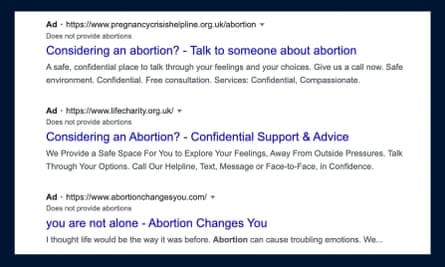Women seeking online advice about abortions are being directed to pregnancy counselling services run by anti-abortion campaigners, an Observer investigation has found.
Google adverts that are styled to look like real search results and appear above genuine listings are routinely being shown to people searching key terms relating to pregnancy and abortion.
In an analysis this month, 117 out of 251 adverts shown by Google UK to a user searching 40 key phrases, including “NHS abortion advice”, “confidential abortion support” and “pregnant teenager help”, were from groups opposed to abortion.
The findings reveal the marketing efforts of anti-abortion groups in the UK and have led to concerns that women could be exposed to biased information when seeking out medical advice. One sexual health charity described the advertising as “clearly immoral”.
The adverts in the analysis – which were offered to a woman in her 20s in London in early February – contain a small tag marking them as advertising but look similar to real search results and appear above trusted information sources, including the NHS website. In some cases they promote advice services that claim to offer impartial support but do not clearly state the anti-abortion views of the people behind them.
One of the biggest advertisers was Pregnancy Crisis Helpline, whose adverts appeared after searches for 14 out of the 40 phrases tested in the analysis. They included one that said: “Considering an abortion? Talk to someone,” and appeared after searches for “buy abortion pill” and “pregnant teenager help”.
People clicking on the links were taken to the helpline’s website, which says it is a “safe and confidential place” offering “support for women struggling with an unplanned pregnancy”.
But while it says it does “not refer for abortions”, neither does it offer information about its organisers’ anti-abortion views and presents itself as an impartial service offering support “away from all the pressures”.
In reality, the helpline was co-launched with Christian Concern, a rightwing evangelical organisation that wants abortion to be banned. The helpline’s trustees include Regan King, a pastor at the Angel church in Islington, London, who has described abortion as “Disgusting. Disturbing. Grim. Gruesome. Horrifying. Shocking. Terrible. Vile” and likened it to “the new slave trade”. Another trustee is Christian Clive Copus, a former director of the anti-abortion campaign group the Prolife Alliance.
The helpline has recently reported a spike in the number of people contacting it, saying it had 2,000 clients in 2022 compared with 500 in 2021.
Other Google adverts directed women to a counselling service run by the charity Life, which opposes abortion. One said: “We provide a safe space for you to explore your feelings away from outside pressures. Talk through your options in confidence.”
Google said the adverts flagged by the Observer complied with its rules, highlighting that they contain an “ad” tag in bold lettering and a line stating that the services they promote do not provide abortions.

But Lisa Hallgarten, head of policy at young people’s sexual health charity Brook, described the marketing approach as “clearly immoral” and said adverts provided to those searching terms such as “NHS abortion advice” could delay women’s access to healthcare.
“We are really concerned that people looking for impartial support are being directed to organisations and websites where they could experience the complete opposite,” she said. Pam Lowe, an expert on anti-abortion activism, said: “Anyone who puts ‘NHS abortion’ into Google should be shown a link to the NHS website as the first result. There’s a risk that people could end up with biased information.”
Labour MP Stella Creasy, who has campaigned on access to reproductive healthcare, urged the government to compel tech companies to remove potentially harmful listings. She said there was a difference between allowing free speech and “seeking to mislead vulnerable readers who need to be confident that what they are reading is medically sound and impartial”.







